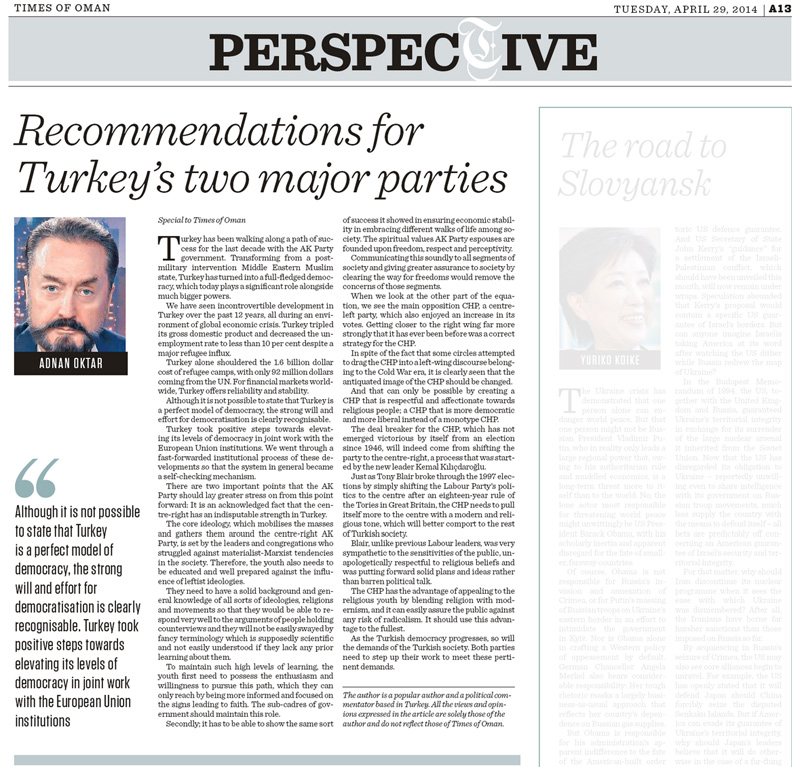
Turkey has been walking along a path of success for the last decade with the AK Party government. Transforming from a post-military intervention Middle Eastern Muslim state, Turkey has turned into a full-fledged democracy, which today plays a significant role alongside much bigger powers.
We have seen incontrovertible development in Turkey over the past 12 years, all during an environment of global economic crisis. Turkey tripled its gross domestic product and decreased the unemployment rate to less than 10 per cent despite a major refugee influx.
Turkey alone shouldered the 1.6 billion dollar cost of refugee camps, with only 92 million dollars coming from the UN. For financial markets worldwide, Turkey offers reliability and stability.
Although it is not possible to state that Turkey is a perfect model of democracy, the strong will and effort for democratisation is clearly recognisable.
Turkey took positive steps towards elevating its levels of democracy in joint work with the European Union institutions. We went through a fast-forwarded institutional process of these developments so that the system in general became a self-checking mechanism.
There are two important points that the AK Party should lay greater stress on from this point forward: It is an acknowledged fact that the centre-right has an indisputable strength in Turkey.
The core ideology, which mobilises the masses and gathers them around the centre-right AK Party, is set by the leaders and congregations who struggled against materialist-Marxist tendencies in the society. Therefore, the youth also needs to be educated and well prepared against the influence of leftist ideologies.
They need to have a solid background and general knowledge of all sorts of ideologies, religions and movements so that they would be able to respond very well to the arguments of people holding counterviews and they will not be easily swayed by fancy terminology which is supposedly scientific and not easily understood if they lack any prior learning about them.
To maintain such high levels of learning, the youth first need to possess the enthusiasm and willingness to pursue this path, which they can only reach by being more informed and focused on the signs leading to faith. The sub-cadres of government should maintain this role.
Secondly; it has to be able to show the same sort of success it showed in ensuring economic stability in embracing different walks of life among society. The spiritual values AK Party espouses are founded upon freedom, respect and perceptivity.
Communicating this soundly to all segments of society and giving greater assurance to society by clearing the way for freedoms would remove the concerns of those segments.
When we look at the other part of the equation, we see the main opposition CHP, a centre-left party, which also enjoyed an increase in its votes. Getting closer to the right wing far more strongly that it has ever been before was a correct strategy for the CHP.
In spite of the fact that some circles attempted to drag the CHP into a left-wing discourse belonging to the Cold War era, it is clearly seen that the antiquated image of the CHP should be changed.
And that can only be possible by creating a CHP that is respectful and affectionate towards religious people; a CHP that is more democratic and more liberal instead of a monotype CHP.
The deal breaker for the CHP, which has not emerged victorious by itself from an election since 1946, will indeed come from shifting the party to the centre-right, a process that was started by the new leader Kemal Kiliçdaroglu.
Just as Tony Blair broke through the 1997 elections by simply shifting the Labour Party's politics to the centre after an eighteen-year rule of the Tories in Great Britain, the CHP needs to pull itself more to the centre with a modern and religious tone, which will better comport to the rest of Turkish society.
Blair, unlike previous Labour leaders, was very sympathetic to the sensitivities of the public, unapologetically respectful to religious beliefs and was putting forward solid plans and ideas rather than barren political talk.
The CHP has the advantage of appealing to the religious youth by blending religion with modernism, and it can easily assure the public against any risk of radicalism. It should use this advantage to the fullest.
As the Turkish democracy progresses, so will the demands of the Turkish society. Both parties need to step up their work to meet these pertinent demands.
Adnan Oktar's piece on Time of Oman:


